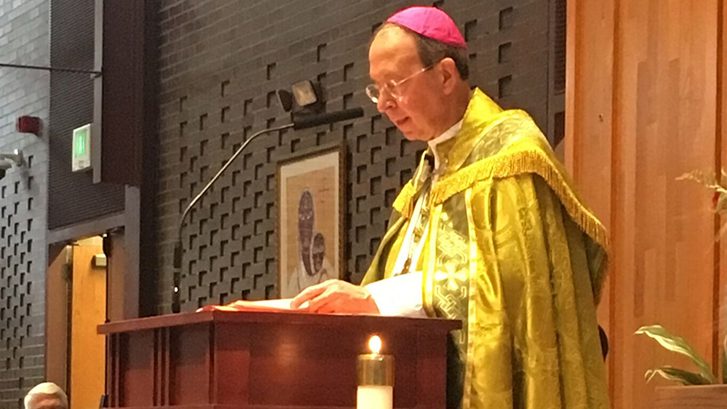30 April, 2017. 3rd Sunday of Easter
Saint Pius V, pope
1st Reading: Acts 2:14, 32-33
At Pentecost, Peter announces the resurrection of Jesus
Peter, standing with the eleven, raised his voice and addressed the crowds, “Men of Judea and all who live in Jerusalem, let this be known to you, and listen to what I say: This Jesus God raised up, and of that all of us are witnesses. Being therefore exalted at the right hand of God, and having received from the Father the promise of the Holy Spirit, he has poured out this that you both see and hear.”
Second Reading: First Letter of St Peter 1:17-21
Christians live in obedience to the Father, founded on faith and hope in Christ, raised from the dead
If you invoke as Father the one who judges all people impartially according to their deeds, live in reverent fear during the time of your exile. You know that you were ransomed from the futile ways inherited from your ancestors, not with perishable things like silver or gold, but with the precious blood of Christ, like that of a lamb without defect or blemish. He was destined before the foundation of the world, but was revealed at the end of the ages for your sake. Through him you have come to trust in God, who raised him from the dead and gave him glory, so that your faith and hope are set on God.
Gospel: Luke 24:13-35
At Emmaus, they recognise Jesus in the breaking of the bread, after he explained the Scriptures to them
Now on that same day two of them were going to a village called Emmaus, about seven miles from Jerusalem, and talking with each other about all these things that had happened. While they were talking and discussing, Jesus himself came near and went with them, but their eyes were kept from recognizing him. And he said to them, “What are you discussing with each other while you walk along?” They stood still, looking sad. Then one of them, whose name was Cleopas, answered him, “Are you the only stranger in Jerusalem who does not know the things that have taken place there in these days?”
He asked them, “What things?” They replied, “The things about Jesus of Nazareth, who was a prophet mighty in deed and word before God and all the people, and how our chief priests and leaders handed him over to be condemned to death and crucified him. But we had hoped that he was the one to redeem Israel. Yes, and besides all this, it is now the third day since these things took place. Moreover, some women of our group astounded us. They were at the tomb early this morning, and when they did not find his body there, they came back and told us that they had indeed seen a vision of angels who said that he was alive. Some of those who were with us went to the tomb and found it just as the women had said; but they did not see him.”
Then he said to them, “Oh, how foolish you are, and how slow of heart to believe all that the prophets have declared! Was it not necessary that the Messiah should suffer these things and then enter into his glory?” Then beginning with Moses and all the prophets, he interpreted to them the things about himself in all the scriptures.
As they came near the village to which they were going, he walked ahead as if he were going on. But they urged him strongly, saying, “Stay with us, becase it is almost evening and the day is now nearly over.” So he went in to stay with them. When he was at the table with them, he took bread, blessed and broke it, and gave it to them. Then their eyes were opened, and they recognized him; and he vanished from their sight.
They said to each other, “Were not our hearts burning within us while he was talking to us on the road, while he was opening the scriptures to us?” That same hour they got up and returned to Jerusalem; and they found the eleven and their companions gathered together. They were saying, “The Lord has risen indeed, and he has appeared to Simon!” Then they told what had happened on the road, and how he had been made known to them in the breaking of the bread.
A Gospel within the Gospel
The dawning understanding of the two disciples on their way to Emmaus is like a gospel within the gospel, and is often used as a summary of what Christian life is all about. For these disciples on the road, all they had hope for seemed to be over and gone. For the previous few years life had been exciting, in the vibrant, inspirational company of Jesus, the prophet and healer. It is unfair to blame them, but they just hadn’t grasped a great deal of what Jesus had said. We can empathise with them, because mostly we too forget or we fail to take seriously the promises of the Lord. He promised that he would be there for us, that he would never abandon us in the storm, that he would walk every step of the road with us, and that he would bring us safely through the desert and the Red Sea of death into the Promised Land of the Father.
Significantly. Jesus uses the Holy Scriptures as his way of enlightening them. The Bible is the revealing word of God, that reveals the very heart of God. The words of scripture are not at all like the passing opinions in our daily newspapers or other media outlets. The word of God is empowered as by an electric current, inspired and shot through with the Spirit of God. With God’s word comes the power to respond to that word, and to carry it out. Because of various factors, the study of scripture was not greatly emphasised or appreciated in Catholic circles. It was seen as more of a Protestant thing, and it was something that ordinary lay persons could not be trusted with interpreting properly. That trend, thankfully, is now reversed, and this is an important part of the whole process of church renewal.
We notice how they recognised Jesus in the breaking of bread. Breaking of bread among friends was a living symbol of friendship and belonging. What was special about the way Jesus broke the bread is something at which I can only hazard a guess. It must have been the whole atmosphere of self-giving that he invested in the act that revealed to them who he really was. There was a level of sincerity, of giving, of sharing, of sacredness that must have been unique to Jesus, and it must have been something they had experienced on previous occasions. This unique something touched their deepest hungers, and the nourishment provided was no longer just a physical thing. It was food that required them to open their hearts as well as their mouths to receive.
Life is a winding, multi-stage journey made up of many smaller journeys. It is a wonderful gift of God’s Spirit to have the sense of being accompanied on the journey, of being led by the Spirit, of having a sense of direction in life. All of this is only possible through my own personal yes, and my willingness to be open to the accompanying presence of the Lord. “You’ll never walk alone when you walk with God” is an important truth. The only real sin for the Christian is not to have hope. Because of Jesus we already have the victory. We are a risen people, a people of power, and a people to whom Jesus has entrusted full authority over all the power of the evil one. Again, all of this makes no difference whatever, unless I personally take possession of what Jesus offers me and makes possible for me. Again and again and again I am called on to repeat my own personal YES of trust and commitment. The response the Lord is most seeking is my YES of here and now.
A life-changing encounter
The Emmaus story is a living paradigm for Christian discipleship. It strongly suggests that if we travel life’s journey with others, sharing our faith and our doubts with them, Christ will be with us, opening our minds to the truth. Just as he gave them deeper insight, so he does for all who listen to him. His promise remains, “I am with you, always!” In those early years they also had many proofs of his powerful presence, as Acts illustrates by various miracle stories. Today’s is told with great satisfaction, dramatising Peter’s healing powers when he called on Jesus’ name. Not only is the crippled man cured, he jumps up, begins to walk about, and then enters the temple with them, “leaping and praising God.” The people’s awe and amazement gives Peter a chance to explain the source of his healing gift: he has it from the risen Christ, now more even powerfully effective than he was during his mortal life.
In truth, we are all on an Emmaus journey, a camino or pilgrimage of faith. We may be perplexed by events in our own lives, disappointments, loss of a job, failure, collapse of a relationship, shattered dreams, betrayal by friends. We are certainly very, very deeply disturbed by things that are happening in our own Church. We are deeply disturbed by the lack of peace in our world, the injustices of society, worries about the future. Everything, indeed, may seem very, very dark. And we may feel as helpless and as hopeless as those two disciples did.
If so, we need community. We cannot fight depression alone. We cannot make sense of things alone. We need to lean on one another for support. We need to search the Scriptures together to see what answers they may have for us. And then we can go out and spread this good news.
Intersecting darkness and light
We tend to walk away from situations and places that have painful associations for us. Sometimes that can be the right thing to do, but perhaps not always. The gospel shows two disciples walking away from Jerusalem, because the city now had very negative associations for them. It was just outside the city that the one they had been following, to whom they had given their lives, was crucified. Jerusalem was the city that killed not only Jesus but also all the hopes they had invested in him. They wanted out of it as quickly as possible. Yet, they should really have stayed put, for the Lord wanted them to remain on in that city.
Although they didn’t realize it at the time, not along was Jerusalem the city where Jesus was put to death; it was also the city where he was raised from the dead and it would be the city where the risen Lord would pour out his Holy Spirit upon the disciples, the city from which his message would begin to be spread to the world. The Lord journeyed with these two disciples to help them to see that there was more to the city of Jerusalem than they realized. It is often the case in our own lives that the places we try to get away from, when we see them as dreary and dark are the very places where the seeds of new life are to be found, and where God is mysteriously but powerfully at work in the darkness. [MH]

